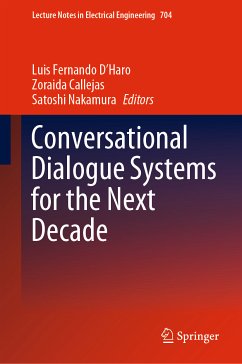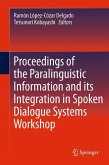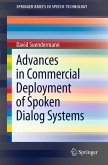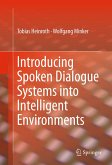Conversational Dialogue Systems for the Next Decade (eBook, PDF)
Redaktion: D'Haro, Luis Fernando; Nakamura, Satoshi; Callejas, Zoraida
97,95 €
97,95 €
inkl. MwSt.
Sofort per Download lieferbar

49 °P sammeln
97,95 €
Als Download kaufen

97,95 €
inkl. MwSt.
Sofort per Download lieferbar

49 °P sammeln
Jetzt verschenken
Alle Infos zum eBook verschenken
97,95 €
inkl. MwSt.
Sofort per Download lieferbar
Alle Infos zum eBook verschenken

49 °P sammeln
Conversational Dialogue Systems for the Next Decade (eBook, PDF)
Redaktion: D'Haro, Luis Fernando; Nakamura, Satoshi; Callejas, Zoraida
- Format: PDF
- Merkliste
- Auf die Merkliste
- Bewerten Bewerten
- Teilen
- Produkt teilen
- Produkterinnerung
- Produkterinnerung

Bitte loggen Sie sich zunächst in Ihr Kundenkonto ein oder registrieren Sie sich bei
bücher.de, um das eBook-Abo tolino select nutzen zu können.
Hier können Sie sich einloggen
Hier können Sie sich einloggen
Sie sind bereits eingeloggt. Klicken Sie auf 2. tolino select Abo, um fortzufahren.

Bitte loggen Sie sich zunächst in Ihr Kundenkonto ein oder registrieren Sie sich bei bücher.de, um das eBook-Abo tolino select nutzen zu können.
This book compiles and presents a synopsis on current global research efforts to push forward the state of the art in dialogue technologies, including advances to the classical problems of dialogue management, language generation, question answering, human-robot interaction, chatbots design and evaluation, as well as topics related to the human nature of the conversational phenomena such as humour, social context, specific applications for e-health, understanding, and awareness.
- Geräte: PC
- ohne Kopierschutz
- eBook Hilfe
- Größe: 9.8MB
Andere Kunden interessierten sich auch für
![Increasing Naturalness and Flexibility in Spoken Dialogue Interaction (eBook, PDF) Increasing Naturalness and Flexibility in Spoken Dialogue Interaction (eBook, PDF)]() Increasing Naturalness and Flexibility in Spoken Dialogue Interaction (eBook, PDF)129,95 €
Increasing Naturalness and Flexibility in Spoken Dialogue Interaction (eBook, PDF)129,95 €![Proceedings of the Paralinguistic Information and its Integration in Spoken Dialogue Systems Workshop (eBook, PDF) Proceedings of the Paralinguistic Information and its Integration in Spoken Dialogue Systems Workshop (eBook, PDF)]() Proceedings of the Paralinguistic Information and its Integration in Spoken Dialogue Systems Workshop (eBook, PDF)161,95 €
Proceedings of the Paralinguistic Information and its Integration in Spoken Dialogue Systems Workshop (eBook, PDF)161,95 €![Conversational AI for Natural Human-Centric Interaction (eBook, PDF) Conversational AI for Natural Human-Centric Interaction (eBook, PDF)]() Conversational AI for Natural Human-Centric Interaction (eBook, PDF)137,95 €
Conversational AI for Natural Human-Centric Interaction (eBook, PDF)137,95 €![Proactive Spoken Dialogue Interaction in Multi-Party Environments (eBook, PDF) Proactive Spoken Dialogue Interaction in Multi-Party Environments (eBook, PDF)]() Petra-Maria StraußProactive Spoken Dialogue Interaction in Multi-Party Environments (eBook, PDF)73,95 €
Petra-Maria StraußProactive Spoken Dialogue Interaction in Multi-Party Environments (eBook, PDF)73,95 €![Spoken Dialogue Systems Technology and Design (eBook, PDF) Spoken Dialogue Systems Technology and Design (eBook, PDF)]() Spoken Dialogue Systems Technology and Design (eBook, PDF)161,95 €
Spoken Dialogue Systems Technology and Design (eBook, PDF)161,95 €![Advances in Commercial Deployment of Spoken Dialog Systems (eBook, PDF) Advances in Commercial Deployment of Spoken Dialog Systems (eBook, PDF)]() David SuendermannAdvances in Commercial Deployment of Spoken Dialog Systems (eBook, PDF)38,95 €
David SuendermannAdvances in Commercial Deployment of Spoken Dialog Systems (eBook, PDF)38,95 €![Introducing Spoken Dialogue Systems into Intelligent Environments (eBook, PDF) Introducing Spoken Dialogue Systems into Intelligent Environments (eBook, PDF)]() Tobias HeinrothIntroducing Spoken Dialogue Systems into Intelligent Environments (eBook, PDF)73,95 €
Tobias HeinrothIntroducing Spoken Dialogue Systems into Intelligent Environments (eBook, PDF)73,95 €-
-
-
This book compiles and presents a synopsis on current global research efforts to push forward the state of the art in dialogue technologies, including advances to the classical problems of dialogue management, language generation, question answering, human-robot interaction, chatbots design and evaluation, as well as topics related to the human nature of the conversational phenomena such as humour, social context, specific applications for e-health, understanding, and awareness.
Dieser Download kann aus rechtlichen Gründen nur mit Rechnungsadresse in A, B, BG, CY, CZ, D, DK, EW, E, FIN, F, GR, HR, H, IRL, I, LT, L, LR, M, NL, PL, P, R, S, SLO, SK ausgeliefert werden.
Produktdetails
- Produktdetails
- Verlag: Springer Nature Singapore
- Seitenzahl: 406
- Erscheinungstermin: 24. Oktober 2020
- Englisch
- ISBN-13: 9789811583957
- Artikelnr.: 60444847
- Verlag: Springer Nature Singapore
- Seitenzahl: 406
- Erscheinungstermin: 24. Oktober 2020
- Englisch
- ISBN-13: 9789811583957
- Artikelnr.: 60444847
- Herstellerkennzeichnung Die Herstellerinformationen sind derzeit nicht verfügbar.
Prof. Luis Fernando D'Haro is an Associate Professor at Universidad Politécnica de Madrid (ETSIT, UPM, Spain). His current research is focused on spoken dialogue, natural language processing, and language and speaker recognition systems. He has published more than 130 papers in peer-reviewed journals, books, and conferences. He co-led the international Dialog State Tracking Challenges (DSTC) in 2015, 2016, and 2017 and the WOCHAT series workshops that target the advance of chatbots systems and their automatic evaluation since 2015. He was local Organizer for INTERSPEECH 2014, HAI 2016, and the International Workshop on Spoken Dialog Systems (IWSDS) in 2018. He is currently the General Chair for IWSDS2020, the Chief Guest Editor for a special issue at Computer Speech and Language for DSTC7, and Co-Organizer for DSTC9, DBDC5, and Chanel workshop at JSALT2020. Prof. Zoraida Callejas obtained a Ph.D. in 2008 at the University of Granada (Spain) where she currently is anAssociate Professor. Her research focuses on areas related to dialogue systems, emotion processing, and user modelling. She has published more than 140 contributions to scientific journals, books, and conferences. She has participated in multiple projects in European and Spanish calls and is currently the Coordinator of the EU H2020-MSCA-RISE project MENHIR and the BONAPPPETIT project on conversational systems for mental health and the adoption of healthy habits by children, respectively. She has organized multiple conferences, workshops, and meetings, the most recent are IEEE BIBM 2018, NII SHONAN meeting on spoken multimodal dialogue systems technology for pervasive computing (2019), and IWSDS 2020. Dr. Satoshi Nakamura is Director of data science centre, Professor of Nara Institute of Science and Technology (NAIST), Team Leader of RIKEN AIP, and Honorary Professor of Karlsruhe Institute of Technology, Germany. He received Ph.D. from Kyoto University in 1992.He was Director of ATR spoken language communication research laboratories in 2005-2008. He was Director-General of Keihanna Research Laboratories, National Institute of Information and Communications Technology, in 2009-2010. His research interests include speech processing, spoken dialogue systems, and natural language processing. He was a member of IEEE SLTC 2016-2018 and an elected board member of International Speech Communication Association, ISCA. He received Antonio Zampolli prize in 2012 and retained the title of ATR Fellow, IPSJ Fellow, IEEE Fellow and ISCA Fellow.
A Character Expression Model Affecting Spoken Dialogue Behaviors.- ToxicBot: A Conversational Agent to Fight Online Hate Speech.- Towards a Humorous Chat-bot Companion for Senior Citizens.- Masheli: A Choctaw-English bilingual chatbot.- Deep AM-FM: Toolkit For Automatic Dialogue Evaluation.- Automatic Evaluation of Non-Task Oriented Dialog Systems by using Sentence Embeddings Projections and their Dynamics.- Learning to Rank Intents in Voice Assistants.- Culture-Aware Dialogue Management for Conversational Assistants.- Dialog State Tracking with Incorporation of Target Value in Attention Models.- Delay Mitigation for Backchannel Prediction in Spoken Dialog System.- Towards Personalization of Spoken Dialogue System Communication Strategies.- Authoring Negotiation Content and Programming Simulated Patients.
A Character Expression Model Affecting Spoken Dialogue Behaviors.- ToxicBot: A Conversational Agent to Fight Online Hate Speech.- Towards a Humorous Chat-bot Companion for Senior Citizens.- Masheli: A Choctaw-English bilingual chatbot.- Deep AM-FM: Toolkit For Automatic Dialogue Evaluation.- Automatic Evaluation of Non-Task Oriented Dialog Systems by using Sentence Embeddings Projections and their Dynamics.- Learning to Rank Intents in Voice Assistants.- Culture-Aware Dialogue Management for Conversational Assistants.- Dialog State Tracking with Incorporation of Target Value in Attention Models.- Delay Mitigation for Backchannel Prediction in Spoken Dialog System.- Towards Personalization of Spoken Dialogue System Communication Strategies.- Authoring Negotiation Content and Programming Simulated Patients.







